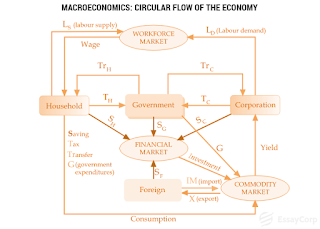 |
| Types Of Economics |
What Is Macroeconomics?
Macroeconomics is that section of economics that analyses the performance and behaviour of an economy as a whole. Macroeconomics is the study of economics that focuses on the factors which affect the entire economy. It looks at indicators like labour, unemployment, productions, growth rate, inflation etc. to assess the economic health of a country. By studying economics we understand how the economy of our country grows and falls. A better economy gives a better life.
 |
| Macroeconomics Topics |
Some Macroeconomics Topics Include:
· Opportunity cost- Opportunity cost refers to an advantage that a person chooses to leave in order to take another. It is the loss of a profit that could be achieved for gaining other opportunities. The opportunity cost is a basic cost in the economics that is applied for calculating cost benefit analysis of a project.
· Demand and supply- In economics the demand and supply is another significant concept. Demand refers to the quantity of a product that is required by the consumers. The quantity implies the amount of a product that the consumers are willing to buy at a definite price. Whereas the supply refers to the amount that the market can offer.
· Elasticity- Elasticity is used to regulate the change in demand. Elasticity changes from product to product because there are goods that are more important to the consumers and products that are less important to the consumers. The demand for goods those are necessary for the consumers are not much affected by the change in price because people will still buy them irrespective of their price.
Study Of Macroeconomics
Experts who monitor macroeconomics focus mostly on signs such as GDP, unemployment rates, etc. They examine the process of relating different sectors of economy in order to comprehend the functioning of the economy. They work on the relationships between so many factors such as inflation, investments, consumption, national income, and output, international trade etc. Macroeconomics is a broad field to work on.
Some Important Macroeconomics Concepts
The basic principles of macroeconomics are:-
1. Tools that are used by the government to stabilize the economy are monetary policy and fiscal policy. The way in which macro policies work can be influenced by the expectation of policies.
2. For the short run, recessions and unemployment can be caused by instability in aggregate demand and the quantity of money in the market.
3. The growth of living takes place in the modern economies because of the human capital and physical advances.
Ap Macroeconomics
Ap macroeconomics stands for advanced placement macroeconomics. Ap is the programme where the students are given the chance to get the college-level education being in high school. It has more than thirty courses with exams. The exams are an essential part in the Ap programme. It prepares the students academically for a good placement opportunity. The Ap teachers help the Ap students to get the best possible training. If one finishes the Ap programme successfully it works as a way to success in the college.
What Is The Difference Between Macroeconomics And Microeconomics?
 |
| Differentiating Between Macroeconomics And Microeconomics |
Differentiating between microeconomics and macroeconomics becomes easier when you learn their focus.
Macroeconomics- Macroeconomics is the study of the national economy as a whole. Issues that affect the whole economy is focused by macroeconomics. It includes economies such as regional, global and national. It looks at the bigger picture which is the entire economy. It determines the health of the overall economy. The foundation of macroeconomics lies in microeconomics.
Microeconomics- Microeconomics is however the study of economics at the level of a group, individual or company. It focuses on the issues that are related to companies and individuals. There are many goals of microeconomics, one of which is to analyse market mechanisms. The most important fields of microeconomics include choice under study, economic applications of game study, general equilibrium etc.
They have few similarities as well
Microeconomics and macroeconomics they might be different from each other but they have an inter-relation. They both affect each other. They have many overlapping issues such as increased inflation. The principles of microeconomics are used in macroeconomics. They both handle the issues of choice, scarcity and use demand and supply.
